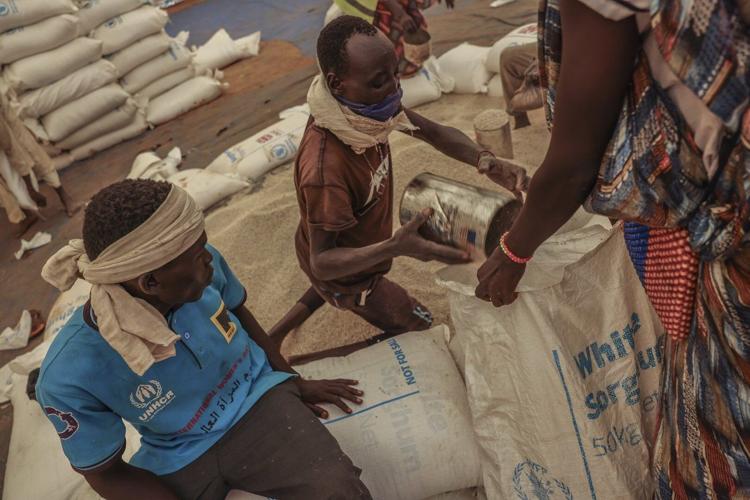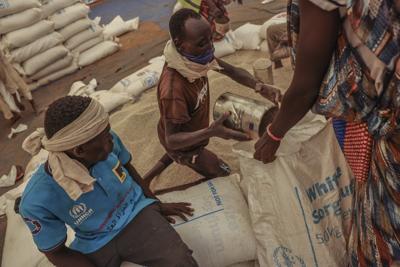NAIROBI, Kenya (AP) ŌĆö The number of aid workers kidnapped in South Sudan has more than doubled this year, according to two senior humanitarian officials working for international groups.
Aid agencies are concerned about the well-being of their staff and the disruption of their life-saving services in a region suffering one of the most severe humanitarian crises.
Several of those kidnapped have been released after ransom payments, said three people with knowledge of the negotiations, but one aid worker died in captivity earlier this month, according to several sources familiar with the incident, including Edmund Yakani, a prominent civil rights activist in the country.
has long designated South Sudan as one of the most dangerous places for aid workers. However, analysts say that the spike in kidnapping for ransom is a new and worrying trend.
ŌĆ£The biggest fear is that this could become a countrywide issue,ŌĆØ said Daniel Akech, a South Sudan expert with the International Crisis Group.
More aid workers kidnapped in 2025
Over 30 South Sudanese aid workers have been kidnapped this year, according to the two humanitarian officials. That is more than double the number of aid workers abducted in all of 2024, according to both officials.
Aid officials spoke to The Associated Press on condition of anonymity because they were not authorized to discuss security matters and feared reprisals against their staff, jeopardizing their organizationsŌĆÖ access in the country.
Fighting in South Sudan between the national army and opposition factions has surged this year, marking some of the worst violence since a 2018 peace deal ended a civil war that killed an estimated 400,000 people and formed a fragile unity government. Some analysts say the clashes are linked to a struggle over President Salva KiirŌĆÖs successor, as speculation about his declining health spikes.
ŌĆ£Some abductions for political reasons, like forced recruitment (of civilians into military conscription), have been done for years, but the abductions for ransom are new,ŌĆØ said Ferenc Marko, an expert on South Sudan.
ŌĆ£It is frankly a worrisome new trend that could make humanitarian work impossible” in the country’s states of Central and Western Equatoria, he said.
A kidnapped aid worker dies in captivity
James Unguba, a South Sudanese aid worker, was kidnapped last month in the county of Tambura, in Western Equatoria state and died in captivity on Sept. 3, according to three people with knowledge of his death who spoke on condition of anonymity in line with regulations.
The three said Unguba, who worked for a local aid organization, was abducted by men dressed in national military uniforms. The exact circumstances surrounding his death werenŌĆÖt immediately clear.
A spokesman for South SudanŌĆÖs military told the AP he had no information about his death and declined to answer questions.
Playing havoc with crucial aid
The kidnappings have hampered life-saving services for hundreds of thousands of people in remote areas along South SudanŌĆÖs southern borders with Uganda, the Democratic Republic of Congo, and the Central African Republic, aid agencies say.
In July, the medical charity Doctors Without Borders, better known by its French acronym, MSF, suspended operations in two South Sudanese counties after one of its staff members was taken at gunpoint while traveling in a clearly marked convoy in the county of Yei, in Central Equatoria state. This came just four days after the kidnapping of another health worker traveling in an MSF ambulance.
ŌĆ£While we are deeply committed to providing care to those in need, we cannot keep our staff working in an unsafe environment,ŌĆØ Doctor Ferdinand Atte, MSFŌĆÖs head of mission in South Sudan, said in a statement.
Armed groups may be behind the kidnappings
Aid officials say it remains unclear who is behind the kidnappings.
However, Akech, with the International Crisis Group, says the region is filled with armed groups seeking quick profit as the economy continues to nosedive and concerns rise about the
In March, Riek Machar, who leads the countryŌĆÖs largest opposition group and who also serves as one of the countryŌĆÖs vice presidents, was placed under house arrest after a local militia with loose ties to him overran an army base near the Ethiopian border.
The national army has since intensified military operations against his forces, who have linked up with other rebel factions, including the National Salvation Front (NAS), a holdout group that never signed the 2018 peace deal and has been battling the government ever since.
ŌĆ£We donŌĆÖt know if these abductions are carried out by NAS, by opposition forces, or by government soldiers,ŌĆØ said civil society leader Yakani. ŌĆ£From what we know, there is no single group responsible.”
While the U.N. and most aid groups adhere to a strict non-payment of ransom policy, families of the victims sometimes use neutral actors, including churches, as intermediaries to make payments, several individuals with knowledge of the negotiations told the AP on condition of anonymity.
Aid workers under pressure
Earlier this year, the administration of U.S. President Donald Trump moved to dismantle the U.S. Agency for International Development, which funded over half of the emergency relief to South Sudan.
that they are likely to reduce contributions as well.
Meanwhile, violence targeting aid workers has surged globally, said independent research group Humanitarian Outcomes. In a report released in August, the organization said 2024 was the deadliest year on record, with 383 aid workers killed and 861 others affected by major violence, warning that 2025 was on track to even surpass it.
___
For more on Africa and development:
___
The Associated Press receives financial support for global health and development coverage in Africa from the Gates Foundation. The AP is solely responsible for all content. Find APŌĆÖs for working with philanthropies, a list of supporters and funded coverage areas at .





















